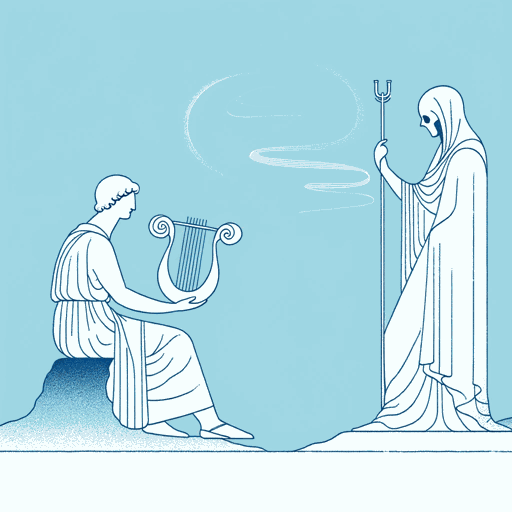35 pages • 1 hour read
EuripidesOrestes
Fiction | Play | Adult | Published in 409A modern alternative to SparkNotes and CliffsNotes, SuperSummary offers high-quality Study Guides with detailed chapter summaries and analysis of major themes, characters, and more.
Summary and Study Guide
Overview
Orestes is an ancient Athenian tragedy by Euripides. It was first presented in 408 BC at Athens’s Great Dionysian Festival. The play treats a familiar piece of Trojan War mythology: Returning home after the war is over, Agamemnon is murdered by his wife Clytemnestra and her lover, Aegisthus. Orestes is Clytemnestra and Agamemnon’s son. To avenge his father, Orestes murders Clytemnestra. Orestes picks up the story after the murder, when a tormented Orestes is branded a matricide, shunned, and faces death by stoning as punishment.
The play was produced 50 years after Aeschylus’s Oresteia, a tragic trilogy that engages the same mythical narrative and is also the only trilogy to survive complete into modern times. Orestes engages similar themes as Aeschylus’s trilogy, notably the importance of justice over vengeance. But while the Oresteia was produced at a time of high public confidence, after Athens’s defeat of the Persian empire, Orestes was produced when Athens was on the brink of losing a protracted and disastrous war against neighboring power Sparta.
Since antiquity, interpreting Euripides has proved difficult and polarizing, at times provoking antithetical scholarly interpretations. His plays seem to have been frequently chosen for production in the Great Dionysia but rarely to have won. Numerous surviving texts of Orestes and its frequently being quoted and alluded to by later authors suggest that Orestes was popular in antiquity, the Greek Middle Ages, and the Renaissance in the West.
This guide refers to the 2013 University of Chicago edition that appears in Euripides IV: Helen, The Phoenician Women, Orestes, translated by William Arrowsmith.
Plot Summary
The play is set in Argos and opens with Electra watching over her sleeping brother, Orestes, who has been tormented by the Furies since murdering his mother, Clytemnestra. Electra explains that Apollo commanded the murder, but it has been received by the men of Argos as a crime. Electra and Orestes have been declared matricides and shunned, and the council of Argos will meet shortly to determine whether the siblings will be executed by stoning. Electra’s one hope lies with Menelaus, Agamemnon’s brother who has recently returned, but she fears the presence of his wife Helen, Clytemnestra’s sister, is a harbinger of trouble.
Helen enters, expressing grief for her sister and pity for her niece and nephew, but Electra does not trust her, believing her to be vain and frivolous. When Orestes wakes up, Electra tells him that Menelaus has returned, but when he is hopeful, Electra frets that Helen and Clytemnestra have disgraced their father’s name. Orestes reminds her that they can be different from the previous generations then lapses into an episode of torment. When he recovers, he laments that his father would not have wanted Orestes to kill his own mother. The Chorus of Argive women sing a prayer to the Furies and Zeus to release Orestes from his suffering.
Menelaus arrives and is shocked by Orestes’s wasted appearance. Orestes says that remorse is eating away at him, though Apollo commanded Clytemnestra’s murder. Telling Menelaus that everyone in Argos is against him, Orestes appeals to Menelaus as a suppliant. A furious Tyndareus, Clytemnestra’s father and Orestes’s grandfather, arrives and rebukes Menelaus for engaging with Orestes. Menelaus attempts to be conciliatory, but Tyndareus rejects his attempts.
While Tyndareus agrees that Clytemnestra was wrong, he argues that Orestes should have sought recourse with the law, not engaged in vengeance that only leads to more violence. Orestes replies that he was justified, since Clytemnestra betrayed her husband and provided a bad example for the women of Hellas. To allow her to live would be to embolden other women with similar intentions. Tyndareus is outraged and asserts he will make sure Electra and Orestes are put to death for their crime. After he departs, Menelaus promises to try to help but qualifies that he can only do so through diplomatic means, which leaves Orestes feeling angry and rejected.
Orestes’s friend Pylades arrives, revealing that his father has banished him for having helped Orestes and Electra kill their mother. After debating their options, Pylades and Orestes decide that Orestes must present his case to the council and hope for pity. After they depart, the Chorus sings of the curse on the house of Atreus. Electra arrives asking after Orestes, and a messenger enters, providing a report of the council: They have decided that Orestes and Electra must die on this day, either by stoning or suicide. The Chorus and Electra lament for the line of Pelops.
Orestes and Pylades return. Pylades cannot bear the thought of his friends dying and concocts a plan to save them: They will kill Helen, which will be celebrated by the Argives who blame her for the loss of their kinsmen in the Trojan War. Orestes is thrilled with the plan and the opportunity to punish those who are tormenting him. Electra suggests using Hermione as a hostage to ensure they can escape. With the Chorus’s help, they implement their plan, but Helen does not die. She vanishes, carried off by Apollo. As Orestes and Pylades face off with Menelaus, threatening to kill Hermione and burn down the palace, Apollo appears, ordering them to reconcile. Zeus has brought Helen, his daughter, to the divine realm, where she will stay. Apollo orders Menelaus to remarry and remain king of Sparta. Pylades and Electra are to marry, as are Orestes and Hermione, with Orestes remaining king of Argos. Apollo and the Chorus chant the final stanzas, an order to honor Peace, “loveliest of goddesses” (195).
Related Titles
By Euripides

Alcestis
Euripides

Cyclops
Euripides

Electra
Euripides

Hecuba
Euripides

Helen
Euripides

Heracles
Euripides

Hippolytus
Euripides

Ion
Ed. John C. Gilbert, Euripides

Iphigenia in Aulis
Euripides

Medea
Euripides

The Bacchae
Euripides

Trojan Women
Euripides

